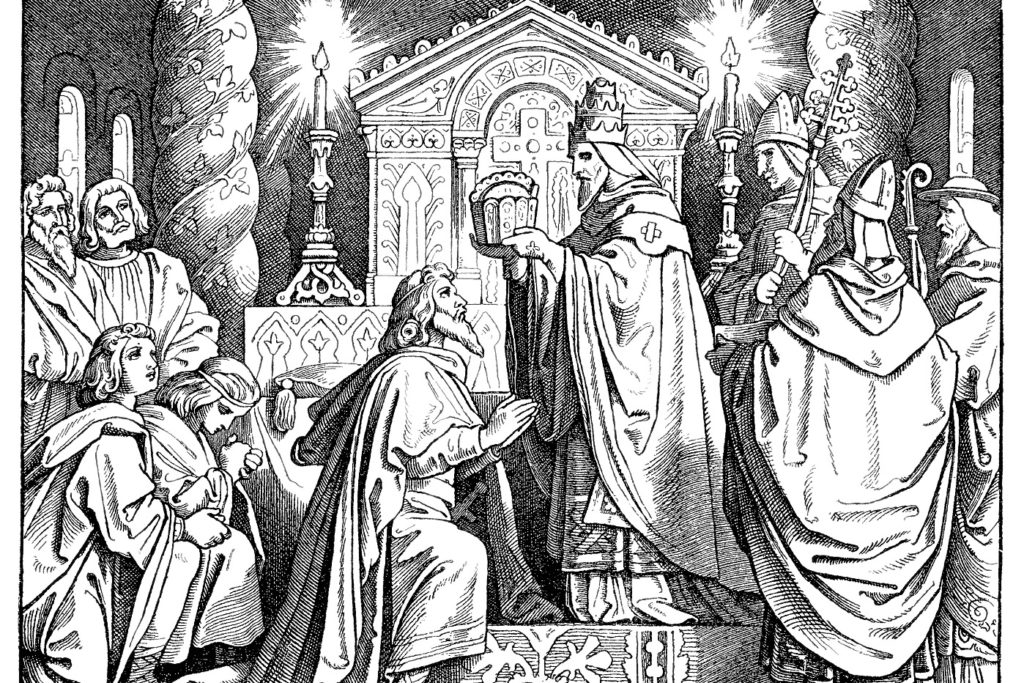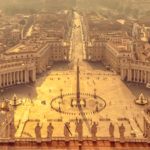A distinctive quirk of many theological works written by Baptists is their profound un-self-consciousness as being Baptist. Whereas Lutherans like me—with our long history of distinguishing ourselves from politically dominant forms of Roman Catholicism or Calvinism—often tie ourselves into knots to demonstrate our distinctive Lutheran-ness, Baptists often seem perfectly content to travel under the banner of “nondenominational Christianity.” And this has probably played a part in the denomination’s remarkable cultural success: sociologically speaking, Southern Baptists’ cultural adaptability and evangelical fervor are key factors underlying their emergence as the largest Protestant denomination in the U.S.
Andrew T. Walker’s new book, Liberty for All: Defending Everyone’s Religious Freedom in a Pluralistic Age, exemplifies this Baptist un-self-consciousness. Though the volume styles itself as a broadly Christian defense of religious liberty as a concept—and, for the most part, makes out a compelling case—it is most interesting as a study in distinctively Baptist political theology. Indeed, Walker’s book suggests that key elements of conservative Baptist thought are bound up with the American political-theoretical project in a unique way, one unparalleled by any other branch of the larger Christian tradition (except perhaps the Church of Jesus Christ of Latter-day Saints). That is interesting enough in its own right.
Undoubtedly, Liberty for All arrives at a significant moment for theologically traditionalist American Christians. Walker is well aware of the turbulent forces affecting today’s religious liberty discourse, acknowledging both pressure from secularizing forces on the left and increasingly outspoken critics of the separation of church and state on the right. Nevertheless, Walker—in an apparent attempt to do for contemporary Protestants what Robert George did for contemporary Catholics—outlines and defends a concept of religious liberty that may broadly be described as classically liberal.
Walker’s case for religious liberty proceeds through three major stages: the eschatological, the anthropological, and the missiological. First, borrowing from David VanDrunen’s recent work on the implications of the “Noahic covenant,” Walker contends that while religious liberty is a good, it is a provisional good—a social good that is always “forward-looking” to the expectation of a final judgment and a final reckoning, in which God will hold all people to account.
Start your day with Public Discourse
Sign up and get our daily essays sent straight to your inbox.In this view, there is no need for human beings to instantiate a utopia on earth, because history will only reach its culmination in the return of Christ. This means that religious coercion is unnecessary because it is God, not human beings, who will ultimately hold the responsibility for judging souls. Second, religious liberty matters because human beings are independent created agents with consciences that cannot be directly coerced by any political authority. And third, religious liberty both makes sense of Christian mission and facilitates it: Christ’s mandate to preach the Gospel to all nations assumes that individuals have the freedom to respond to it, and political structures that permit such mission work can help encourage the salvation of souls.
There is no need for human beings to instantiate a utopia on earth, because history will only reach its culmination in the return of Christ. This means that religious coercion is unnecessary because it is God, not human beings, who will ultimately hold the responsibility for judging souls.
Walker is also keen, however, to build out a justification for religious liberty that does not rely on specifically Christian premises. Here, he draws on the concepts of adoration, authenticity, and authority: ordinary human beings naturally incline toward objects of ultimate desire, seek to live consonant with their inmost convictions, and experience their lives as impelled by duties to forces higher than themselves. This is perhaps the book’s strongest section, one that reads like an unusually elegant reinterpretation of Charles Taylor’s The Ethics of Authenticity. It also reads as significantly less ad hoc than the basic-goods-based defense of religious liberty emphasized by the new natural law theory school of John Finnis and his disciples.
As a generalized defense of religious liberty from a distinctively Christian perspective, Liberty for All is a success. The central theme of Walker’s book is both intellectually compelling and deeply rooted in the Christian tradition. As Walker describes it, religious liberty is the logical consequence of an orthodox view of God as the transcendent horizon of all human effort, toward which all human beings strive—albeit sometimes in confused and disordered ways—and a view of human beings as agents with consciences not subject to direct political coercion. In this framing, religious liberty is less a political doctrine than a description of reality itself. Governments can either align themselves with that truth or attempt in vain to fight it.
Unsurprisingly, though, the devil is in the details. In particular, Walker’s book appears committed to two principles that, if not quite contradictory, are at least in tension with one another.
- There is no coherent approach to a political doctrine that speaks of rights, responsibilities, and social order apart from an ultimately transcendent foundation.
- Governments should not have explicit metaphysical or religious commitments.
Any government that attempts to internalize both of Walker’s principles must find itself pushed toward a kind of self-deluding positivism, acting in practice as if it has religious commitments but denying any such commitments if pressed. This is a recipe, in the end, for the creeping ingress of profoundly theological notions about human beings’ nature and their final end—but notions that, at every step, masquerade as neutral reason. In other words, it is a recipe for the moral dissensus of the present moment.
At one point, Walker acknowledges that religious liberty can be restricted where the state has a “compelling interest” in doing so. This isn’t a principle derived from classical Christian thinking on religious liberty, but rather from U.S. Supreme Court case law. And what counts as a compelling interest, anyway? Does the prevention of hate speech—if such speech can be demonstrated to have physiological effects on its targets—rise to that level? Or what about the voguish concept of dignitary harm, or an injury to one’s sense of personal identity? None of the answers to these questions is self-evident, because they are grounded in highly disputed views about the nature of reality.
One is driven inexorably, it would seem, to the conclusion that there is no truly religiously neutral political order. The controversial political theorist Carl Schmitt likely got it right when he wrote that “all significant concepts of the modern theory of the state are secularized theological concepts.” Is the propagation of a desiccated “civil religion” the only way to walk this tightrope? Not for Walker, who repudiates the idea of civil religion tout court, seeing in such ritual practice an unacceptable substitute for the fullness of Christian faith. Whither, then, the thoughtful Christian political thinker who wants to defend religious liberty without ushering in the inevitable collapse of civic morality?
Contrary to the loud claims of some critics on the right, the alternative to modern fragmentation need not be the Spanish Inquisition or Calvin’s Consistory. It is possible, perhaps, to defend an ideal of religious liberty within the classical liberal tradition, so long as one is willing to drop Walker’s second point and acknowledge that that tradition is not strictly “neutral.” A few years ago, Kevin Seamus Hasson (founder of the Becket Fund for Religious Liberty) penned a book entitled Believers, Thinkers, and Founders: How We Came to Be One Nation Under God, which has received far less attention than it merits. Hasson contends that the metaphysical presupposition of the American experiment is none other than the “philosopher’s God” of St. Thomas Aquinas and the Western intellectual tradition before him: the architect of cosmic order, who may be known in a (very) limited sense through human reason. It is the acknowledgment of this “philosopher’s God” that serves as the necessary philosophical underpinning for the approach to religious liberty that Hasson and Walker share. Such acknowledgment cannot solve all the problems of pluralism, but it offers a basis for taking religion seriously and warding off the Nietzschean charge that religious claims are at bottom none other than self-serving power plays.
For Walker, though, any specifically “confessional” state, even one committed to a fairly limited concept of God, risks interfering with the sanctity of individual assent by conflating the roles of church and state. The ethic of personal choice, in this view, is sacrosanct—but of course, it also happens to be the kerygma of modern secularizing liberalism. Though Walker takes pains to assert in his epilogue that he is not writing an apologetic for liberal democracy as such, . . . if it looks like a duck, swims like a duck, and quacks like a duck, then it probably is one.
To the extent one wishes to operate within contemporary life’s liberal-democratic framework rather than interrogate that framework, Walker lays out about the strongest possible case for a robust principle of religious liberty.
It is not clear what alternative philosophical paths Walker has available, however, given that Walker’s particular model of religious liberty seems to be the culmination of a coherent interpretation of American Baptist theology. In the book’s appendix, Walker even develops the interesting claim that religious liberty finds its fullest expression within a traditionally Baptist ecclesiology.
Based on his book, I originally suspected that Walker—unusually among prominent Baptists these days—is a traditional “free will Baptist” as opposed to a Reformed Baptist. I’ve since been corrected on this, but the idea of individual assent to faith nevertheless plays a key role in his argument. Indeed, for Walker the practice of infant baptism naturally leads to a conflation of church membership with state citizenship (as both are “unchosen”)—and so therefore, restricting church membership to those who have joined of their own volition preserves the integrity of the church as a community of free believers.
This argument, though, is troublesome. For one thing, all it takes is a slight reframing of the issue to reveal the oddity of Walker’s claim: when an individual is born into any household, he or she automatically assume the rights and responsibilities of being a son or daughter without any choice in the matter. Does the imposition of such duties risk conflating the biological family and the state? Surely not. For another, birthright citizenship isn’t a historical universal (it certainly wasn’t the norm in the Roman Empire within which Christianity emerged).
Finally, the fundamental logic of infant baptism strikes me as the precise opposite of caesaropapism: infant baptism communicates that from the very earliest days of an individual’s life, he or she belongs to a community that precedes and transcends the nation-state, one capable of imposing a claim superior to any made by Caesar. To be baptized is to belong to a community that persists whether or not any given political regime survives. As such, it is a deeply subversive act.
Whether these implications are inevitably downstream of core Baptist claims is, of course, a subject up for additional debate. Perhaps somewhere out there is an alternative Baptist take on religious liberty willing to draw more heavily on the elements of Reformed theology that have influenced American Christian thought from its earliest days. In any event, Liberty for All is an invitation to contemplate the subject further.
To the extent one wishes to operate within contemporary life’s liberal-democratic framework rather than interrogate that framework, Walker lays out about the strongest possible case for a robust principle of religious liberty. That is a worthwhile achievement in its own right.












